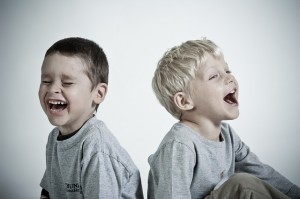
Teaching your toddler’s heart to grow with his body: Fostering social/emotional development
Marking your toddler’s physical growth can be as easy as a series of black marks running up a door frame with dates affixed. Understanding how well their cognitive functions and brains are developing can be gauged with some shared time with a favorite book or play activity, but there’s another aspect of raising a healthy child that’s the third point on a triangle any involved parent wants to consider and that’s their social and emotional development.
At the heart of this concept are some simple ideas. By the time your baby grows into a toddler, they are starting to understand what they are  feeling, who they are and what they should be expecting from others. Experts in the field often refer to this as childhood mental health and helping to foster a positive sense of this in your toddler means you’ll be laying the foundations that will help them understand how to express, manage and experience emotions, explore their environment and, perhaps most importantly of all, make and sustain relationships.
feeling, who they are and what they should be expecting from others. Experts in the field often refer to this as childhood mental health and helping to foster a positive sense of this in your toddler means you’ll be laying the foundations that will help them understand how to express, manage and experience emotions, explore their environment and, perhaps most importantly of all, make and sustain relationships.
Social and emotional development helps your child to understand how they feel about themselves and how they will experience others. Like a lot of other milestones in your toddler’s life, there are a few markers you should be looking for to make sure everything in their emotional and social selves is developing properly.
Household Chores
Beyond the basics like stating their names as well as that of their parents and their age, a toddler that is developing properly should enjoy contributing and doing their part as far as household chores go. They should be washing and dressing by themselves and learning how to take turns and cooperate with others.
The first teacher and the person that can help this process along is also the most important one in their young lives. As a parent, there are a few things you can do and setting up playdates for a child between 18 and 24 months is a great way to get started. While there is a learning curve that does take some time to perfect, this is an excellent age for your child to start learning all about cooperative play. It’s best if you can place them in a playgroup where there are children and even adults of different ages for them to interact with.
More personal
Of course you can take a more personal approach to help with the social and emotional development of your toddler by playing games with them that involve learning how to share. Rolling or kicking a ball back and forth are excellent ways to teach them this skill.
Another great way to foster this development is by adding a name to his emotions. When you give names to the ways he reacts to different situations, you make his emotional responses less scary and more easy to identify.
Finally, providing a caring and nurturing environment at home is an excellent way to tell your child they are a special and unique individual. As their new social and emotional development skills emerge, showing them love and affection shows them how they can express the same to others.
Read more info like this at All My Children.
Author: Rob Starr